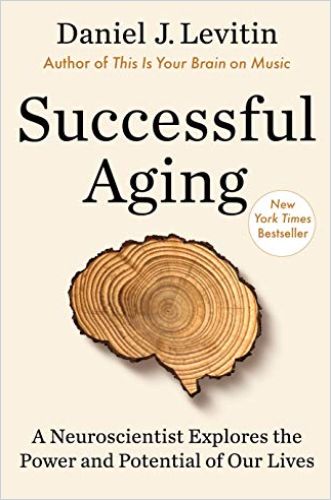Bestseller Daniel Levitin details habits, practices and attitudes that ensure graceful, joyous aging.

Happier Later Years
After surveying approximately 4,000 peer-reviewed science journal articles, best-selling professor emeritus of psychology, neuroscience and music at McGill University, Daniel Levitin describes genetic, cultural and environmental factors that affect how you age. He demolishes destructive myths of aging and provides an invaluable list of factors under your control – such as diet, movement, social engagement and attitude – that fuel a long, healthy and productive final phase of life.
Health Span
Fully 75% of people older than 75 “who ever lived” are alive now. You can influence your health and lifespan. Your genes matter, but even those, for example, suggesting a propensity for Alzheimer’s, activate depending on environment, circumstances, luck and the choices you make.
Learning how to avoid certain environments, habits and stimuli that influence our personalities in negative ways is a crucial part of aging well.Daniel Levitin
Consider renowned artist Grandma Moses, for example, who began painting at age 75. Or folksinger Judy Collins who reinvented herself and went back on tour at age 80. Collins urges you to never stop growing, traveling or learning.
Healthy Old Age
Your brain constantly changes throughout your life until you die. Levitin explains that the choices you make and the opportunities you seize play a significant role in whether you age well.
Genetics is not an edict – the traits that our genes contribute to still need to navigate the twisty and unpredictable roads of culture and opportunity.Daniel Levitin
If you do the things you always wanted to do, the latter span of life can be among your happiest years.
Myths
According to studies across 72 countries, happiness begins increasing in your mid-50s and peaks in your early 80s. Older people get along with people better, but often become more risk averse, less curious, more introverted and less conscientious.
Pain – whether physical or emotional – warns you about dangerous activities or habits and incentivizes you to do something about it.
The key to remembering things is to get involved in them actively. Passively learning something, such as listening in a lecture, is a sure way to forget it.Daniel Levitin
Blood flow to the brain decreases with age, but memory does not necessarily diminish. Older people perform well at perception, abstract thinking, problem-solving and pattern recognition.
Older people may face memory impairment, but Levitin warns against buying into destructive myths about memory loss.
Brain Development
People learn and experience intellectual growth at any age, provided they remain healthy. Metabolic changes, muscle tone, the five senses and neurological change deteriorate. Still, wisdom, tolerance, compassion, joyousness, abstract thinking and pattern recognition improve, as does social problem-solving.
Older brains are plastic, capable of great feats of rewiring and adaptation; it just takes a little longer because much (but not everything) that older brains do is slowed down.Daniel Levitin
As you age, you become increasingly prosocial, optimistic, balanced, grateful, happy and comfortable with yourself. The older you get, the more accepting and self-aware you become. Again, old age associates with more happiness and less depression. Levitin counsels you to reject the myth that you stop growing new brain cells and cease making new neural connections as you age – your brain adds up to 700 new neurons per day.
COACH
Levitin urges you to embrace five traits and actions, represented by the acronym COACH, to improve your lifespan and health span.
A mentally engaged life requires curiosity. Fight memory loss and cognitive decline by acquiring new information through experiences. Pay more attention to what you want to remember. Develop routines for where you put, for example, your car keys and glasses.
In your 60s and 70s, you may lose your appetite for risk and novelty. Overcome these impulses, Levitin suggests, by meeting new people, traveling, trying new foods and restaurants, visiting museums and learning.
Openness and curiosity correlate highly with good health and long life.Daniel Levitin
Isolation accelerates stress, and leads to Alzheimer’s, causes depression and shortens life. Your conversations – in person, not virtually – are among the most complex and beneficial things you do. Reading facial and body language and adding to the conversation to keep it moving excite all parts of your brain. Maintain a vibrant social life.
Take care of yourself, visit your doctor regularly and practice preventative health. This is the single most important factor under your control regarding health span, longevity and happiness.
The single most important factor in determining successful aging is the personality trait of conscientiousness.Daniel Levitin
Do what your doctor suggests – such as giving up red meat, for example, taking your medications and exercising. You must move. Exercise increases the flow of oxygenated blood to your brain, keeping it healthy and enhancing intellectual acuity. Walking a trail, for example, requires you to keep your balance, pay attention and make constant adjustments.
Levitin suggests practicing high-intensity interval training. For example, walk extremely fast for a minute or two to increase your heart rate, slow down for five minutes, and then repeat a few times. Your brain evolved to navigate and move, so if you sit on a couch or restrict your movements to an exercise room, these areas of your brain will atrophy.
Most people need eight hours of sleep. What appears to be Alzheimer’s symptoms can result from sleep deprivation, which strongly correlates with contracting Alzheimer’s. Go to bed at the same time every night and get up at the same time each morning. Practice yoga and similar exercises to manage pain.
Eat food. Not too much. Mostly plants. (food journalist Michael Pollan)
Follow a moderate, Mediterranean diet rich in fatty acids, fruits, whole grains, vegetable proteins and antioxidants. Avoid bad cholesterol and processed foods. Eat less and eat earlier in the day. Increase fluid intake.
Keep Learning
Testosterone injections, vitamin B12, antidepressants, hearing and sight aids, meditation and even small-dose psychedelics can extend health span by changing attitudes, restoring physical capabilities and boosting cognitive functions.
The best strategy for cognitive health is to keep doing new things – things that require new ways of thinking.Daniel Levitin
Mindfulness, avoidance of undue stress and practicing COACH principles are the best practices for a longer, healthier life.
Sound Advice
Levitin cites multiple sources for his assertions, which gives him powerful credibility. And, happily, Levitin’s sources combine to offer truly optimistic news that, to a shocking degree, contradicts common assumptions about aging. Levitin is easy to read, and reiterates certain points to drive his message home, but that proves welcome, not annoying. Even younger readers will find sound guidance regarding healthful habits. Older readers will regard Levitin’s advice as indispensable.
Daniel Levitin also wrote The Changing Mind; This Is Your Brain on Music; The Organized Mind; and Weaponized Lies.













